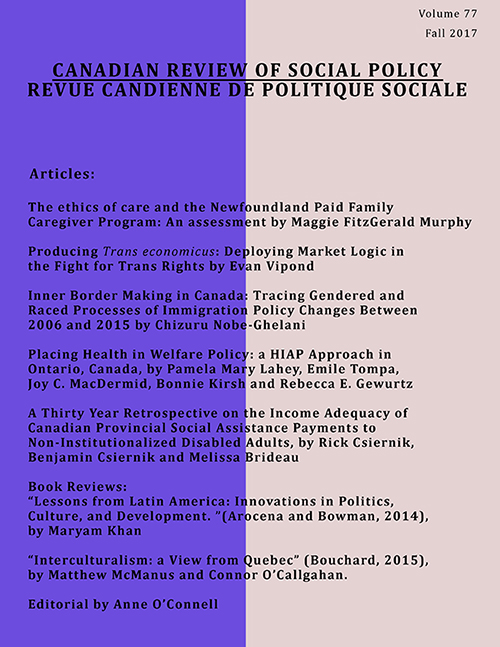The ethics of care and the Newfoundland Paid Family Caregiver Program: An assessment
Mots-clés :
critical ethics of care, long-term care, direct funding programs, normative policy analysisRésumé
The ethics of care has gained traction as a feminist normative lens from which to examine policies and policy issues (Hankivksy 2004; Mahon and Robinson 2011; Sevenhuijsen 2003; Sevenhuijsen et al. 2006). This paper aims to contribute to this growing literature by employing a critical ethics of care lens to assess a long-term care initiative in the province of Newfoundland and Labrador, Canada. This initiative, called the Newfoundland Paid Family Caregiver Program (NPFCP), allows eligible participants to pay family members for some care services. This analysis uncovers numerous tensions, both practical and theoretical, related to the way this program (re)shapes the caring relations of participants. Specifically, the paper discusses the ways in which this program downloads caring responsibilities onto the family, characterizes care as a private concern, and fails to facilitate competent and consistent care.
Résumé
L’éthique du care (voir aussi éthique de la sollicitude) a gagné en popularité en tant que notion féministe qui examine les politiques et les enjeux politiques (Hankivksy 2004; Mahon and Robinson 2011; Sevenhuijsen 2003; Sevenhuijsen et al. 2006). Cet article a pour but de contribuer à cette littérature grandissante en abordant l’éthique du care d’un oeil critique afin d’interpréter l’initiative de soin de longue durée dans la province de Terre-Neuve-et Labrador au Canada. Cette initiative, appelée Newfoundland Paid Family Caregiver Program (NPFCP) est un programme permettant aux participants admissibles d’obtenir des soins rémunérés d’un membre de sa famille. Cette analyse décèle de nombreuses tensions, pratiques et théoriques, liées à la manière dont le programme redéfinit la sollicitude des participants. Plus précisément, cet article aborde la façon dont ce programme transfert la responsabilité des soins à la famille, traite les soins comme une affaire privée et ne facilite pas les soins professionnels et continus.
Mots clé: Éthique du care crucial ; soin de longue durée ; programmes de financement direct ; analyse normative des politiques
Téléchargements
Publié-e
Comment citer
Numéro
Rubrique
Licence
1-The author guarantees that the manuscript is an original work not published elsewhere in print or electronically in whole or in part, except in abstract form, that the author has the full power to make this contribution, and that the manuscript contains no matter libelous or otherwise unlawful or which invades the right of privacy or which infringes any proprietary right.
2-The author guarantees that the manuscript has not been previously published in print or electronically and that if the manuscript contains any tables, figures or images fully reproduced or closely adapted from previously published material, the author must obtain the necessary permission from the author/publisher holding the original copyright prior to publication in CRSP. The author may be required to produce evidence of permission granted to CRSP’s editors.
3-As a condition of publication in CRSP, the author assigns all copyright to CRSP, including but not limited to the right to publish, republish, and otherwise distribute this manuscript in print, electronic, or other formats. As CRSP is a non-profit interdisciplinary scholarly journal, the author will receive no royalty or other monetary compensation for the assignment set forth in this agreement.
For the purpose of full disclosure, CRSP will not normally use the content provided by the author in a commercial venture, but for the purpose of disseminating the author’s content to as many readers as possible. For distribution, third parties engaging in commercial activities may be contracted to distribute the content globally, and such parties may make a profit out of the author’s content in their normal course of business. CRSP will not pay the author or reimburse the author in any form based on such commercial activities because the conduct of such commercial activities is outside the control of CRSP.
Any future reference to or use of this published material by the authors must acknowledge CRSP as the original place of publication.
PERMISSION REQUEST/ARCHIVING
Permission is given to author(s) receiving funding via Tri-Council Agencies, the Canadian Institutes of Health Research (CIHR), the Natural Sciences and Engineering Research Council of Canada (NSERC) and the Social Sciences and Humanities Research Council (SSHRC), to make their publications freely available in an Open Access repository within the stated deadline by the Tri-Council Agencies (12 months following publication). Archiving of publication must be a manuscript copy bearing none of the CRSP headers, footers or any other distinguishing marks. No links to the article on the CRSP website is permitted.
Permission requests from third parties to reproduce articles in part or full in academic/educational publications can be directed to the managing editor of CRSP, and will not be unreasonably denied.

